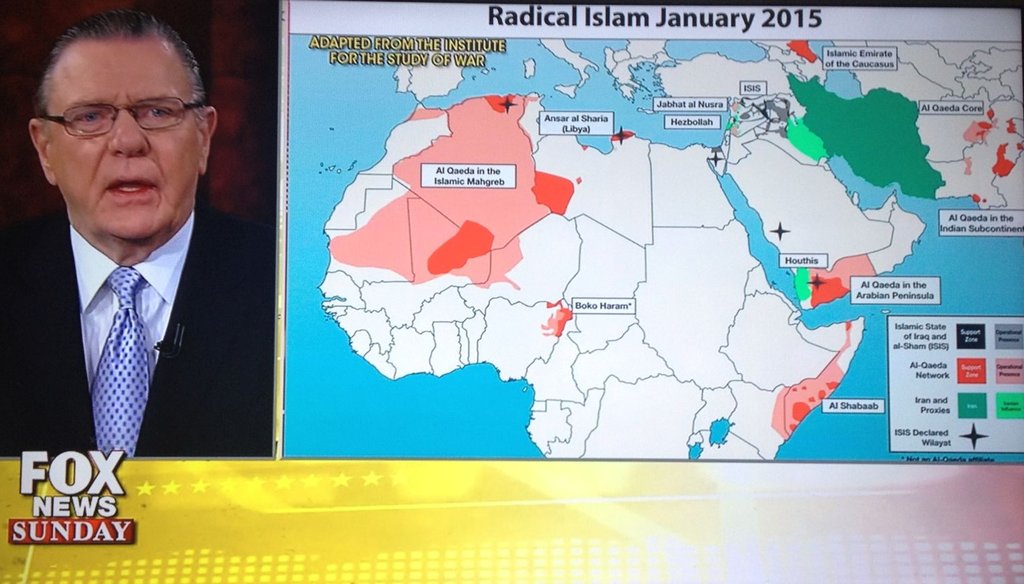Stand up for the facts!
Our only agenda is to publish the truth so you can be an informed participant in democracy.
We need your help.
I would like to contribute

Retired Army Gen. Jack Keane said al-Qaeda has grown "fourfold" in the past five years.
Retired general says al-Qaida has grown 'fourfold' in last 5 years
Al-Qaida has grown exponentially in recent years, retired four-star Army Gen. Jack Keane said.
On Fox News Sunday Feb. 1, host Chris Wallace asked Keane if the administration has a strategy to combat Islamic extremism.
Keane said, "We do not. Al-Qaida has grown fourfold in five years. ISIS, which began when we pulled out politically and military from Iraq, grew from an organization less than 3,000 to an organization over 30,000 in three years. Radical Islamists spread from Western Africa through the Middle East, all the way to South Asia to sub-Indian continent."
Keane first mentioned the fact that al-Qaida has quadrupled since 2010 in testimony before the Senate Armed Services committee last week. We wondered if it was accurate.
The short answer is maybe, depending on your definition. Experts cautioned that it’s nearly impossible to know how large al-Qaida is in terms of membership. And Keane’s figure is just an estimate extrapolated from an earlier analysis. It also relies on a broad definition of "al-Qaida."
Defining al-Qaida
So who is Keane talking about when he says "al-Qaida"?
Back in the early 2000s, and before 9/11, al-Qaida was generally understood to mean the several hundred people who swore allegiance to Osama bin Laden, said Larry Johnson, a consultant specializing in counterterrorism and a former CIA employee.
Now when people think of al-Qaida, they usually think of a much broader category consisting of that core group, plus affiliates and other Sunni Islamic extremists, such as the Islamic State of Iraq and Syria, located throughout the Middle East, North Africa and the Indian subcontinent.
Under this broad definition, Johnson said Keane’s claim that al-Qaida has grown fourfold since 2010 -- while impossible to verify -- is probably accurate.
"Fourfold is probably an underestimate," added Frederick Kagan, director of the American Enterprise Institute’s Critical Threats project.
But not everyone agrees to such a broad discussion.
Anne Stenersen, a research fellow in terrorism at the Norwegian Defense Research Establishment, said the narrowly defined al-Qaida -- that is, its core members -- has stayed relatively stable at fewer than 300 members since 2010. She prefers this definition because the affiliates have varying strategies and objectives.
For example, al-Qaida actually split from the Islamic State due to ideological differences.
Johnson also noted that some regional groups that have al-Qaida in their names -- like al-Qaida in the Islamic Maghreb or al-Qaida in the Arabian Peninsula -- were given those names by the West, so they do not necessarily reflect how close those groups are to the core al-Qaida group.
The evidence
At the Senate hearing, Keane shared this map that shows various al-Qaida affiliates and other Islamic extremist groups throughout the region as of January:
Featured Fact-check
Keane told us his advisers came up with the fact that al-Qaida has increased fourfold by relying on a 2014 report from the think tank RAND. The RAND report found that between 2010 and 2013, the number of Islamic jihadist fighters doubled, and the number of attacks tripled.
Given the continued rise in activity since 2013 and based on discussions with experts, Keane and his advisers concluded that the size of al-Qaida and its affiliates has essentially doubled again since the RAND report was published. The RAND report relied on both unclassified and classified primary sources to come up with its counts.
The trouble trying to count
However, every expert we spoke with -- as well as government spokespeople -- said it’s not feasible to quantify the size of al-Qaida and its global affiliates. Other than this RAND report, there’s no official count of the number of Islamic extremists that we can use to see how the group’s manpower has grown since 2010.
"All that said, al-Qaida is almost certainly bigger than it was five years ago. It's the fourfold that I would question," said J.M. Berger, a nonresident fellow at the Brookings Institution. "For each of these groups, we can only estimate their size, and all estimates are disputed."
Kagan, of the American Enterprise Institute, said several al-Qaida groups are much larger than they were five years ago because of the 2011 Arab Spring. The revolutions left many countries without stable leadership and institutions, making them vulnerable to the rise of extreme religious groups.
This is what’s happening in Libya with the rise of al-Qaida affiliates, in Syria with the al Nusra front and Yemen with al-Qaida in the Arabian Peninsula.
Kagan added that in the past five years, al-Qaida in the Islamic Maghreb in West Africa, as well as Boko Haram in Nigeria, which doesn’t have official ties to al-Qaida, have grown tremendously.
And the United States invasion and later removal from Iraq destabilized the country, Johnson said, giving way to the rise of the Islamic State.
"Al-Qaida and its affiliates have expanded enormously over the last five years," Kagan said. "They have transformed from being terrorists to insurgent organizations and in some cases insurgent armies."
Kagan and Johnson both cited the United States’ limited response to the Arab Spring as well as its policies in dealing with Iraq and Iran as contributing to the rise in Islamic extremism throughout North Africa and the Middle East.
Bruce Hoffman, director of Georgetown University’s Center for Security Studies, said his research has shown that the number of al-Qaida affiliates has more than doubled from eight to 17 since 2008. Adding the Islamic State, once an affiliate, to that count would dramatically increase the number of fighters.
"I can’t pin an exact number to Gen. Keane’s assertion — but it doesn’t sound wildly off base to me," Hoffman said.
Our ruling
Keane said, "al-Qaida has grown fourfold in five years."
There’s two tricky parts to Keane’s particular claim. The first is defining al-Qaida. While the group that previously followed Osama bin Laden has remained at about the same size, there is no doubt among experts that we’ve seen a rise in the number of jihadist fighters overall. Many of those fighters were inspired by al-Qaida.
The second is pinning a specific number on the growth. RAND said the number of terrorists has doubled between 2010 and 2013. Keane basically estimates that the number of jihadist fighters has doubled again.
Is that right? Maybe. Maybe not. The evidence is thin, but the experts say his claim is a reasonable estimate.
Weighing everything, we rate this claim Half True.
Our Sources
Fox News Sunday, transcript, Feb. 1, 2015
RAND blog, "The accelerating spread of terrorism," June 3, 2014
RAND, "Increase in Jihadist Threat Calls for New U.S. Strategy to Combat Terrorism," June 4, 2014
USA Today, "Al-Qaeda hasn't gone away, and is gaining," Jan. 8, 2014
New York Times, "Map of Countries Where Al Qaeda and Its Affiliates Operate," accessed Feb. 1, 2015
Wall Street Journal, "Shadowy Figure: Al Qaeda's Size Is Hard to Measure," Sept. 10, 2011
PolitiFact, "David Gregory: Al-Qaida cast off ISIS as 'too extreme,'" Aug. 13, 2014
PunditFact, "Dick Cheney: Number of terrorists has doubled," June 22, 2014
Senate Armed Services Committee, Keane testimony, Jan. 27, 2015
Interview, Gen. Jack Keane, Feb. 1, 2015
Interview, counter-terrorism consultant Larry Johnson, Feb. 1, 2015
Interview, Frederick Kagan, director of AEI’s Critical Threats project, Feb. 1, 2015
Email interview, Anne Stenersen, terrorism expert at FFI in Norway, Feb. 1, 2015
Email interview, Bruce Hoffman, director of Georgetown’s Center for Security Studies, Feb. 1, 2015
Email interview, National Security Council spokesman Ned Price, Feb. 1, 2015
Email interview, Brookings fellow J.M. Berger, Feb. 1, 2015
Email interview, Brookings fellow Bruce Riedel, Feb. 1, 2015
Browse the Truth-O-Meter
More by Lauren Carroll
Retired general says al-Qaida has grown 'fourfold' in last 5 years
Support independent fact-checking.
Become a member!
In a world of wild talk and fake news, help us stand up for the facts.




























































